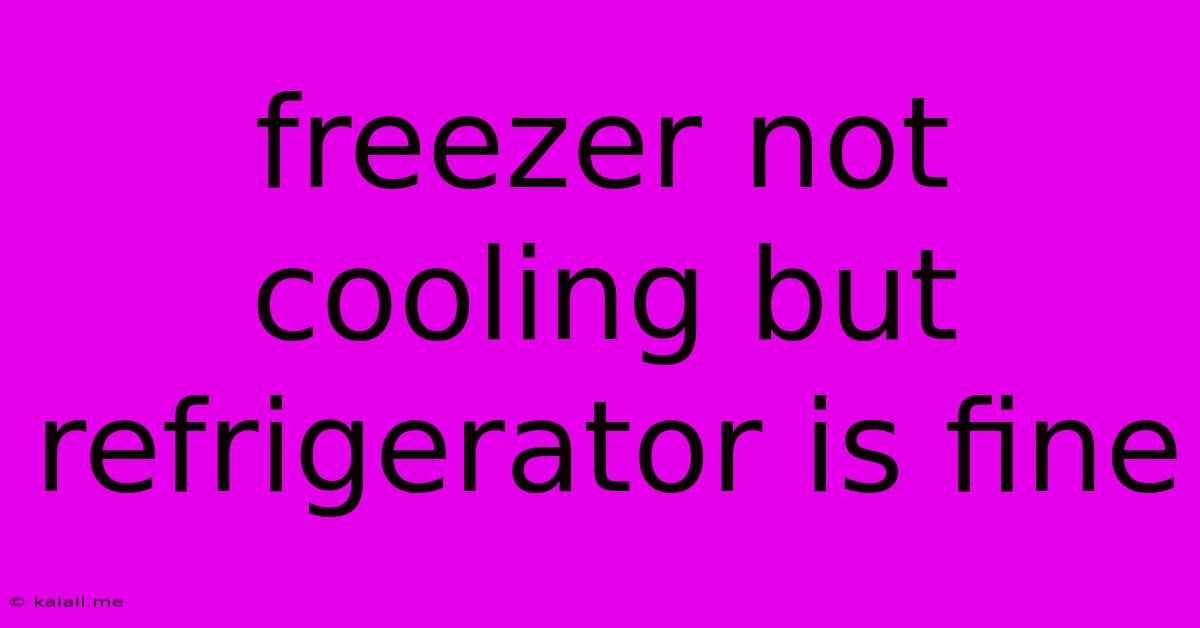Freezer Not Cooling But Refrigerator Is Fine
Kalali
Jun 11, 2025 · 4 min read

Table of Contents
Freezer Not Cooling But Refrigerator is Fine: Troubleshooting Guide
Meta Description: Is your freezer not cooling, but your refrigerator section works perfectly? This comprehensive guide helps troubleshoot common causes, from simple fixes to more complex repairs, saving you time and money.
A malfunctioning freezer while the refrigerator still functions correctly is a frustrating issue. It means potentially spoiled food and the need for costly repairs. Before you call a repairman, let's troubleshoot this problem together. This guide will walk you through common causes and solutions, empowering you to fix the issue or at least better understand what's wrong before seeking professional help.
Common Causes of a Freezer Not Cooling While the Refrigerator Works
Several factors can lead to this specific problem. Let's break down the most frequent culprits:
-
Faulty Freezer Door Seal: A damaged or poorly sealed freezer door allows cold air to escape, reducing cooling efficiency and potentially leading to warmer temperatures inside the freezer. Check the seal for any cracks, tears, or gaps. A simple test involves placing a piece of paper along the seal and closing the door. If the paper slides out easily, your seal is likely compromised.
-
Clogged or Restricted Air Vents: Internal air vents are crucial for circulating cold air between the freezer and refrigerator compartments. If these vents become obstructed by food items, ice buildup, or debris, proper airflow is hampered, impacting the freezer’s cooling capacity. Inspect the vents and carefully remove any blockages.
-
Defrost Issues: Automatic defrost systems rely on heating elements and a defrost drain to melt frost buildup. Problems with the heating element, control board, or a clogged defrost drain can prevent proper defrosting, leading to excessive ice accumulation and poor cooling in the freezer. Check for excessive ice buildup, particularly near the defrost drain, located at the bottom of the freezer compartment.
-
Evaporator Fan Motor Problems: The evaporator fan motor circulates cold air within the freezer. If this motor fails, the freezer won't cool adequately, even if the compressor is running. Listen for the fan motor’s hum; if it's silent or making unusual noises, it might be the cause.
-
Refrigerant Leaks: While less common, refrigerant leaks significantly impact cooling performance. Refrigerant is responsible for absorbing heat, and a leak diminishes its effectiveness. This typically requires professional assistance, as refrigerant handling is specialized. Identifying a refrigerant leak requires specialized tools.
-
Compressor Issues: The compressor is the heart of your refrigerator, and if it's malfunctioning, it can directly affect the freezer’s cooling. Though less likely to impact just the freezer, a failing compressor can manifest as poor cooling in that specific compartment. A compressor issue usually requires professional attention.
Troubleshooting Steps: A Systematic Approach
-
Check the Obvious: Begin with simple checks. Ensure the freezer is plugged in securely and the power switch is turned on. Check the circuit breaker or fuse to rule out a power supply problem. Obvious issues are often the simplest to fix.
-
Inspect the Door Seal: Carefully examine the freezer door seal for damage. Replace a damaged seal promptly, as it's a relatively inexpensive fix.
-
Clear Air Vents: Thoroughly clean and clear any obstructions from the air vents between the freezer and refrigerator compartments. Even seemingly minor blockages can dramatically affect performance.
-
Check for Ice Buildup: Assess the amount of ice buildup. Excessive ice indicates a defrosting problem that may necessitate professional help or a more involved repair.
-
Listen to the Evaporator Fan: Listen for the hum of the evaporator fan. If it's not running, this could point to a faulty motor that needs replacement.
-
Assess the Temperature: If you have a thermometer, place it inside the freezer compartment to accurately gauge the temperature. This provides a concrete measurement to evaluate the effectiveness of your troubleshooting steps.
When to Call a Professional
While many issues can be addressed with simple troubleshooting, some problems require professional expertise. If you suspect a refrigerant leak, a compressor problem, or a more complex electrical issue, contacting a qualified refrigerator repair technician is essential. Attempting repairs beyond your skill level could cause further damage or pose safety risks. Remember, safety should always be the priority.
Latest Posts
Latest Posts
-
What Is The Worlds Largest Bay
Jun 12, 2025
-
Leader Who Wrote The Discovery Of India
Jun 12, 2025
-
The Land Of The Morning Calm
Jun 12, 2025
-
What Is 50 Of 50 Of 50
Jun 12, 2025
-
Which Of The Following Is An Example Of Intrinsic Motivation
Jun 12, 2025
Related Post
Thank you for visiting our website which covers about Freezer Not Cooling But Refrigerator Is Fine . We hope the information provided has been useful to you. Feel free to contact us if you have any questions or need further assistance. See you next time and don't miss to bookmark.